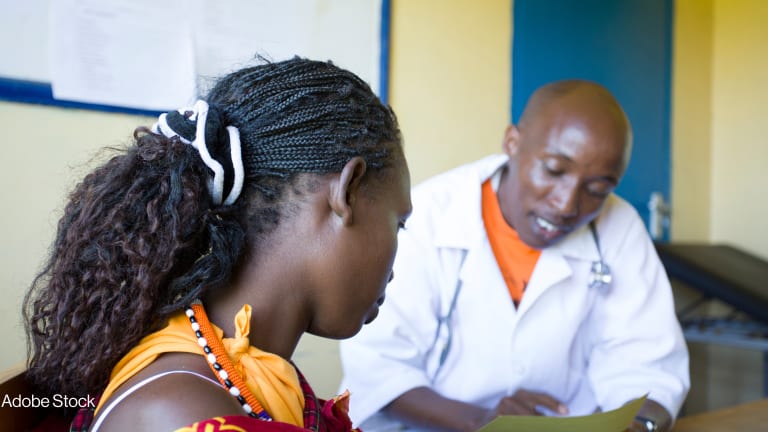
Last year, our team challenged ourselves to engage differently with our global health and noncommunicable disease partners. We chose to engage in design thinking — not to create a new innovation or technological solution, but to enhance connections across a diverse set of global health partners to truly listen, learn, and iterate around the question of health care sustainability in low-resource settings with underserved populations.
“Are we truly open to being advised by, and not just listening to, those who experience health care firsthand?”
— Paurvi Bhatt, vice president, Medtronic Philanthropy; president, Medtronic FoundationThe questions started out easy: “How could we reimagine health care if we had all the resources in the world?” Each of our teams came back with different options for an elaborate health care scheme. Then we considered the opposite: “What would health care look like if we had no resources?”
Each team — when pressured with the ultimate resource constraint — converged on a common, unscripted solution: “Start with the patient as the leader, as the commander of all resources and priorities, and build from there.” Why did it take a scenario of complete scarcity to start with the patient? In our documents and speeches, we all state that being patient-centered is key, yet these scenarios and real-life experiences demonstrate that it is not a natural, easy, or routine occurrence. Why is this?
Let’s take a step back. Those of us working in health care know the numbers, costs, burdens, and frustrations. We’ve been building the case for expanding resources for health care based on the looming concerns. Is it possible that we have lost sight of the opportunities along the way? What if we curated different conversations, enabled people affected by illnesses to advise us, pressuring and challenging our own notions and pushing us to think differently? Are we truly open to being advised by, and not just listening to, those who experience health care firsthand?
When we accelerated our global health focus at the Medtronic Foundation, we ensured a sharp focus on improving health outcomes for underserved populations around the world.
Learning from various movements in health and social change, we observed that delivering measurable improvement in health outcomes begins with authentic involvement, engagement, and championing of patients and frontline health workers improving health in their communities.
We realized quickly that these voices were not only unheard, but they were not involved in the dialogue shaping the health of their communities.
Putting patients at the heart of health care delivery
To shift this paradigm, we engaged patients, advocacy organizations, and partners as thought leaders to help elevate and demonstrate a commitment to active engagement of those involved in health care every day. This involvement shapes clear theories of change and measurement frameworks that we all need to translate how health outcomes can be achieved in our respective institutions.
Recognizing that these crucial patient perspectives had been lost in our hunger for log frames and return on investment calculations, we intentionally elevated partnerships to build storytelling and engagement skills with patients and frontline health workers to ensure they have leadership roles alongside government officials at key global policy discussions.
Additionally, we created advisory boards to advise our largest investments — each co-led by patients and frontline health workers.
In response to these actions, we’ve seen incredible results across a range of systems and conditions, from rheumatic heart disease outcomes in Uganda to improving survival for sudden cardiac arrest in low-resource urban areas in the United States.
We’ve also pushed demonstrable progress in inclusion of patient and frontline perspectives with decision-makers, notably in the lead up to and at this year’s third High-level Meeting on NCDs and the Global Conference on Primary Health Care. The most essential outcome across this work was the irreplaceable opening of dialogue across sectors, patients, providers, underserved communities, and donors. This hunger for engagement far outpaced a need for championing and began a true belief across partners that these voices need to be the first, not last, step of our continuous process to improve health.
How can we accelerate these dialogues and ensure they sustain beyond any one donor or program cycle?
Breaking down what ‘meaningful involvement’ actually is
Meaningful involvement, as defined in a recent NCD Alliance publication, is about inviting people as true partners — in our case patients and frontline health workers — and recognizing the value of their contribution and sharing the power to plan and play an active role in projects.
It builds a reciprocal relationship with people — and it’s about working “with” rather than “for.” It’s not about consulting people after a decision has already been made. True meaningful inclusion requires thoughtful planning up front.
As explained by one of the workshop participants, meaningful involvement isn’t issuing an invitation on a Tuesday to a stakeholder involvement meeting on Wednesday for a report coming out Friday.
Flip the script
According to the NCD Alliance, a “participation ladder” can be instrumental in helping understand and shift the way engagement occurs. After all, we know organizational behavior doesn’t change overnight. You have to ease into it, moving from participation to collaboration, and finally partnering in true co-production.
Realizing that each step creates value in different ways is essential.
Drive results
We’ve seen this play out in our work and it’s led to results. HealthRise Brazil was grounded in meaningful inclusion from the start.
Patients were actively engaged in storytelling workshops and connected to key conferences to share their perspective. We also created a structured country advisory committee, which ensured their perspectives were part of the decisions made to influence the direction of our work and the work of governments and others in the NCD field.
We know that truly shifting the dialogue and engaging first in the principles of involvement can lead to improvement of sustained health outcomes. It might not be easy, but it will be a meaningful and shared experience that leads to the results that matter.
If you’re like us, we’re eager to see health for all realized, but we know it can’t be done if we don’t change the power dynamics; if we don’t open up true seats at the table for those who matter most.
Flip the script and create a better story. We can’t wait to learn with you along the way.
Learn more about Medtronic Foundation’s work here.








